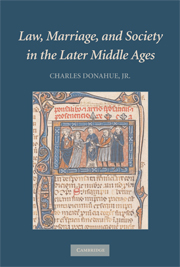Book contents
- Frontmatter
- Contents
- List of Tables
- List of Appendices
- Preface
- Acknowledgments
- Notes About This Book
- Introduction
- 1 The Background Rules and Institutions
- 2 Lying Witnesses and Social Reality: Four English Marriage Cases in the High Middle Ages
- 3 Statistics: The Court of York, 1300–1500
- 4 Story-Patterns in the Court of York in the Fourteenth Century
- 5 Story-Patterns in the Court of York in the Fifteenth Century
- 6 Ely
- 7 Paris
- 8 Cambrai and Brussels: The Courts and the Numbers
- 9 Cambrai and Brussels: The Content of the Sentences
- 10 Divorce a mensa et thoro and salvo iure thori (Separation)
- 11 Social Practice, Formal Rule, and the Medieval Canon Law of Incest
- 12 Broader Comparisons
- Epilogue and Conclusion
- Bibliography and Abbreviations
- Subject Index
- Texts and Commentary
- Table of Cases
- Table of Authorities
- Index of Persons and Places
10 - Divorce a mensa et thoro and salvo iure thori (Separation)
Published online by Cambridge University Press: 14 July 2009
- Frontmatter
- Contents
- List of Tables
- List of Appendices
- Preface
- Acknowledgments
- Notes About This Book
- Introduction
- 1 The Background Rules and Institutions
- 2 Lying Witnesses and Social Reality: Four English Marriage Cases in the High Middle Ages
- 3 Statistics: The Court of York, 1300–1500
- 4 Story-Patterns in the Court of York in the Fourteenth Century
- 5 Story-Patterns in the Court of York in the Fifteenth Century
- 6 Ely
- 7 Paris
- 8 Cambrai and Brussels: The Courts and the Numbers
- 9 Cambrai and Brussels: The Content of the Sentences
- 10 Divorce a mensa et thoro and salvo iure thori (Separation)
- 11 Social Practice, Formal Rule, and the Medieval Canon Law of Incest
- 12 Broader Comparisons
- Epilogue and Conclusion
- Bibliography and Abbreviations
- Subject Index
- Texts and Commentary
- Table of Cases
- Table of Authorities
- Index of Persons and Places
Summary
THE COURT OF YORK
We begin with a case that does not seem at first glance to be very promising. All that survives are four membranes of depositions of six witnesses, who were examined in the consistory court of York, two of them on 21 February, two on 22 February, and two on 30 March 1349. The roll is damaged, and some of the testimony has to be reconstructed. Fortunately, the testimony is quite consistent, and we can be reasonably confident that what is missing in one witness's testimony followed closely what is present in that of others.
The story that the witnesses tell is chilling. They testify that one Richard Scot of Newcastle upon Tyne boasted in various pubs that he had committed adultery with at least three, probably six, and perhaps seven different named women and that he had children by at least three, probably four, and perhaps five of them, which children he had supported and recognized as his own. They also testify, somewhat confusedly, that Richard had been cited, perhaps more than once, before the official of the archdeacon of Northumberland in the church of St John in Newcastle where he had confessed his adulteries and was condemned to do penance. They further testify that on one occasion – though they are quite vague about the date – Richard had beaten his wife, Marjorie (Margery) Devoine, with a stick about her head and shoulders and had drawn blood.
- Type
- Chapter
- Information
- Law, Marriage, and Society in the Later Middle AgesArguments about Marriage in Five Courts, pp. 521 - 561Publisher: Cambridge University PressPrint publication year: 2008



